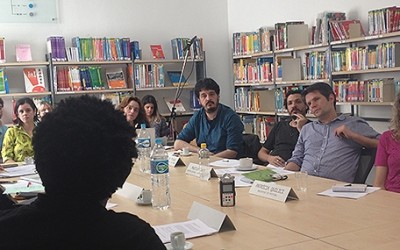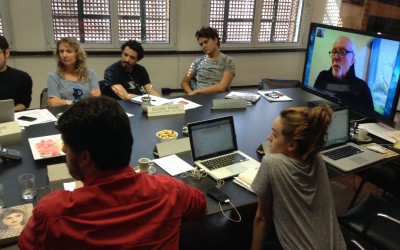Southern Observatory is a research and debate platform set to run from May to August 2015 via a partnership between the Contemporary Art Festival SESC_Videobrasil and Episodes of the South, conceived and hosted by the Goethe Institut in São Paulo. The program is devoted to problematizing the uses, contexts and developments of the notion of “global south” in the art and human sciences fields. The idea is to address the concept of South from a critical and historical perspective, through a program built around four thematic sections. They are: Counter- narratives, Documents and Manifestos, Geopolitics of Knowledge, Regionalisms and Decenterings.
Datasheet
Southern Observatory
19th Contemporary Art Festival SESC Videobrasil
Episodes of the South
May – August 2015
Sesc Pompeia, Goethe Institut
São Paulo, Brazil
Curatorship and Coordination | Sabrina Moura
Guests | Amy Buono, Kelly Gillespie, Pedro Cesarino, Marcelo Rosa, Neo Muyanga, Gabi Ngcobo, Daniel Lima, Maria Elisa Cevasco, Rita Carelli, Walter Mignolo, Solange Farkas, Siba, Moacir dos Anjos.
Associate Researchers | Alex Flynn, Marina Guzzo, Cristina Boniglioli, Nathalia Lavigne
Participants | Ruy Luduvice, Alcimar Fraz‹o, Lorena Vinci, Luiz Rangel, Particia Marchesoni.
The quest to define what is (or what is from) the South denotes an a priori outlook that often curtails the possibilities for speculation on such an imprecise category. Our proposal for the first Observatory session does not therefore attempt to discuss its boundaries or definitions. Instead, we will approach the South as a project, or perhaps a discourse device that suggests contours and makes inroads into recent discussions on the legitimization of forms of knowledge and epistemologies constituted outside the Euro-American axis. How does the notion of “South” enable us to access the revisions that have taken place in the social sciences field since the second half of the 20th century? What tools does this concept provide us to consider alternative forms of cultural networks?





[…] the shows that made up the 19th Contemporary Art Festival Sesc_Videobrasil. In connection with the Southern Observatory study program, initiated in May 2015 in partnership with the Goethe-Institut, the seminar discussed […]
what is the use of tadalafil tablets
Southern Observatory – VASTO
help writing a argumentative essay
Southern Observatory – VASTO
online essay service
Southern Observatory – VASTO
college essay proofreading service
Southern Observatory – VASTO
academic essay writers
Southern Observatory – VASTO
best college application essay service
Southern Observatory – VASTO
essay editor service
Southern Observatory – VASTO
community service essay sample
Southern Observatory – VASTO
student essay help
Southern Observatory – VASTO
best cheap essay writing service
Southern Observatory – VASTO
college admission essay editing services
Southern Observatory – VASTO
essays service
Southern Observatory – VASTO
narrative essay writing help
Southern Observatory – VASTO
best essay for you
Southern Observatory – VASTO
mba essay editing service
Southern Observatory – VASTO
the help essays
Southern Observatory – VASTO
allopurinol online pharmacy
Southern Observatory – VASTO
xanax online us pharmacy
Southern Observatory – VASTO
pharmacy store near me
Southern Observatory – VASTO
uk pharmacy xanax
Southern Observatory – VASTO
peoples rx pharmacy austin
peoples rx pharmacy austin
cialis interactions
cialis interactions
viagra online sale in india
viagra online sale in india
cialis sex pill
cialis sex pill
how much tadalafil should i take
how much tadalafil should i take
viagra pills cheap online
viagra pills cheap online
tadalafil online india
tadalafil online india
how much does tadalafil cost
how much does tadalafil cost
viagra cream australia
viagra cream australia
generic viagra from usa
generic viagra from usa
viagra pills online south africa
viagra pills online south africa
online pharmacy usa viagra
online pharmacy usa viagra
cialis trial pack
cialis trial pack
cialis and grapefruit enhance
cialis and grapefruit enhance
pharmacy cost of viagra
pharmacy cost of viagra
online pharmacy concerta
online pharmacy concerta
price of cialis
price of cialis
canadian pharmacy tadalafil
canadian pharmacy tadalafil
where to buy viagra online in usa
where to buy viagra online in usa
viagra otc in canada
viagra otc in canada
cialis generic 2017
cialis generic 2017
difference between cialis and tadalafil
difference between cialis and tadalafil
preferred rx pharmacy
preferred rx pharmacy
viagra price in south africa
viagra price in south africa
viagra by pfizer
viagra by pfizer
sildenafil 100mg online canada
sildenafil 100mg online canada
where to get cheap viagra
where to get cheap viagra
where to buy generic viagra in canada
where to buy generic viagra in canada
order viagra online no prescription
order viagra online no prescription
tadalafil use in females
tadalafil use in females
brand cialis for sale
brand cialis for sale
when to take cialis 20mg
when to take cialis 20mg
stendra vs cialis
stendra vs cialis
flagyl susp
flagyl susp
gabapentin chemo
gabapentin chemo
bactrim ibd
bactrim ibd
pregabalin vs. gabapentin migraine
pregabalin vs. gabapentin migraine
valacyclovir clarithromycin
valacyclovir clarithromycin
nolvadex kidneys
nolvadex kidneys
metformin identify
metformin identify
furosemide gebruiksaanwijzing
furosemide gebruiksaanwijzing
nortriptyline lisinopril
nortriptyline lisinopril
rybelsus 3 mg tablet for weight loss
rybelsus 3 mg tablet for weight loss
not losing weight on semaglutide reddit
not losing weight on semaglutide reddit
.75 mg semaglutide
.75 mg semaglutide
gabapentin hypothyroidism
gabapentin hypothyroidism
ativan and zoloft
ativan and zoloft
flagyl листовка
flagyl листовка
should cymbalta and lyrica be taken together
should cymbalta and lyrica be taken together
duloxetine for trigeminal neuralgia
duloxetine for trigeminal neuralgia
where can i buy cheap generic viagra online
where can i buy cheap generic viagra online
what bacteria does cephalexin kill
what bacteria does cephalexin kill
escitalopram to citalopram conversion
escitalopram to citalopram conversion
is keflex and ancef in same family
is keflex and ancef in same family
fluoxetine中文
fluoxetine中文
side effects of lexapro 10 mg
side effects of lexapro 10 mg
azithromycin z pack side effects
azithromycin z pack side effects
cephalexin vs amoxicillin
cephalexin vs amoxicillin
ciprofloxacin dosage
ciprofloxacin dosage
bactrim cost
bactrim cost
bactrim price
bactrim price
500 mg amoxicillin for sinus infection
500 mg amoxicillin for sinus infection
diltiazem contraindications
diltiazem contraindications
citalopram price
citalopram price
desmopressin acetate ddavp side effects
desmopressin acetate ddavp side effects
is flexeril a benzo
is flexeril a benzo
effexor side effects first week
effexor side effects first week
cozaar medicine
cozaar medicine
contrave yellow urine
contrave yellow urine
is flomax a sulfa based drug
is flomax a sulfa based drug
diclofenac otc
diclofenac otc
ezetimibe mutuabile
ezetimibe mutuabile
depakote weight loss
depakote weight loss
augmentin during pregnancy
augmentin during pregnancy
allopurinol davis pdf
allopurinol davis pdf
amitriptyline 10 mg tablet
amitriptyline 10 mg tablet
what is aripiprazole used for
what is aripiprazole used for
aspirin molecular weight
aspirin molecular weight
drinking on bupropion
drinking on bupropion
celebrex for headache
celebrex for headache
does buspar cause weight gain
does buspar cause weight gain
celexa interactions
celexa interactions
augmentin antibiotic
augmentin antibiotic
baclofen classification
baclofen classification
robaxin pill
robaxin pill
when to take abilify
when to take abilify
how long for protonix to work
how long for protonix to work
actos einnahmezeitpunkt
actos einnahmezeitpunkt
raw semaglutide x
raw semaglutide x
acarbose hexal
acarbose hexal
remeron side effect
remeron side effect
repaglinide emea
repaglinide emea
how long does venlafaxine stay in your system
how long does venlafaxine stay in your system
50 mg spironolactone twice a day
50 mg spironolactone twice a day
tamsulosin samenerguss blase
tamsulosin samenerguss blase
sitagliptin 50mg metformin 850 mg
sitagliptin 50mg metformin 850 mg
ivermectin 4 mg
ivermectin 4 mg
synthroid corticosteroid
synthroid corticosteroid
is tizanidine an nsaid
is tizanidine an nsaid
how safe is voltaren gel
how safe is voltaren gel
tadalafil 20 walgreens price
tadalafil 20 walgreens price
cialis online pills
cialis online pills
sildenafil 20 mg how many can i take
sildenafil 20 mg how many can i take
levitra 20mg how to use
levitra 20mg how to use
levitra cheapest online
levitra cheapest online
sildenafil 20 mg not working
sildenafil 20 mg not working
wegmans pharmacy
wegmans pharmacy
buy tramadol troy pharmacy
buy tramadol troy pharmacy